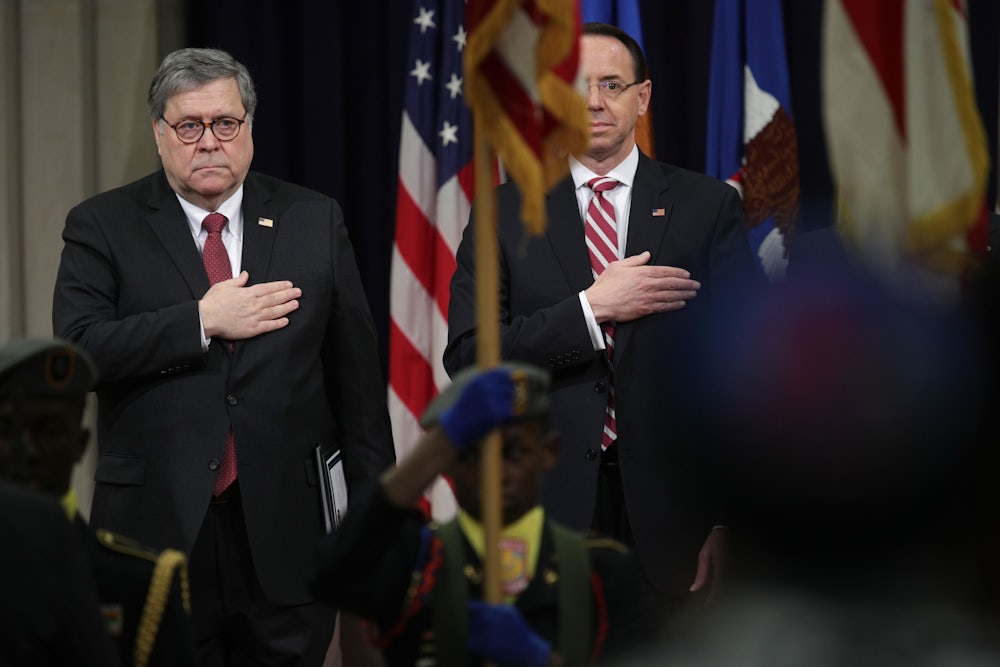The Mueller report, set to be released in redacted form on Thursday, will be a test of Attorney General Bill Barr’s integrity. Many critics expect him to flunk it. “I don’t trust Barr,” House Speaker Nancy Pelosi told the Associated Press last week. “I trust Mueller.” Some have even accused Barr of a cover-up, a case bolstered by reporting that special counsel Robert Mueller’s findings may be more damning for President Donald Trump than Barr had suggested in his summary to Congress last month.
A notable exception to this discontent is Rod Rosenstein. The deputy attorney general appointed Mueller nearly two years ago, and since then has defended the Russia investigation’s legitimacy from presidential and congressional attacks. Over the past few weeks, he’s used that credibility to defend his boss as he wraps up the probe. “[Barr] knows the history, he understands the issues, he respects the employees, and he will defend the principles,” Rosenstein wrote for Time’s list, released on Wednesday, of the year’s 100 most influential people. “With Bill Barr at the helm, the rule of law is secure.”
This presents a tricky quandary for Barr’s critics. Rosenstein is perhaps the only current official in the Justice Department with the credibility among Trump’s opponents to defend Barr. (Mueller could as well, but he’s not prone to public comments.) While figures like former FBI Director James Comey have argued that Barr should get the benefit of the doubt, Rosenstein’s knowledge of Mueller’s findings lends authority to that view. But his staunch defense of Barr presents its own risks for the deputy attorney general. Giving Barr’s actions the imprimatur of legitimacy only works if they turn out to be legitimate in the long run.
Barr’s actions so far have not inspired much confidence in his independence from the White House. In congressional testimony last week alone, he suggested that federal agents may have illicitly spied on the Trump campaign during the last presidential election. Barr later backpedaled on the allegation, but the damage was already done. Trump crowed on Twitter that he had been vindicated by Barr’s statements. Top Democrats wasted no time in airing their own grievances.
“Mr. Barr knows how counter-intel investigations work,” Virginia Senator Mark Warner, the top Democrat on the Senate Intelligence Committee, said in a statement. “He knows there was ample evidence of Russian attempts to infiltrate the Trump campaign and that the FBI took lawful action to stop it. Giving a wink and a nod to this long-debunked ‘spying’ conspiracy theory is irresponsible.” California Representative Adam Schiff, who chairs the House Intelligence Committee, said Barr’s assertions “strikes another destructive blow to our democratic institutions.”
Barr’s wink apparently delivered results for Trump: A Politico/Morning Consult poll released on Wednesday found that nearly four in ten voters believe Trump’s 2016 campaign was spied on. Even a quarter of Democrats believe as much.
Barr had little credibility among Democrats and liberal observers even before he was confirmed to his current job. In the summer of 2017, he drafted an unsolicited 19-page memo for the Justice Department on whether Mueller could theoretically charge the president with obstruction of justice for firing Comey a few months earlier. Barr, relying only on public information, called that avenue of the inquiry “fatally misconceived” and said it infringed on the executive branch’s authority. “Mueller should not be permitted to demand that the President submit to interrogation about alleged obstruction,” he wrote.
Rosenstein downplayed the memo’s significance when it became public in December, while Barr awaited confirmation. “Our decisions are informed by our knowledge of the actual facts of the case, which Mr. Barr didn’t have,” he told reporters. But the memo’s existence may explain why Rosenstein still works at the Justice Department. The deputy attorney general was originally slated to leave his post in mid-March, but he extended his tenure last month to help wrap up the Russia investigation. Staying in his post not only allowed Rosenstein to protect the probe from inappropriate meddling, but also to ensure its conclusions would enjoy more legitimacy than Barr alone could prove.
Since then, he’s worked to insulate Barr’s decisions from public criticism by extending his own credibility to him. Rosenstein gave a rare interview last week to The Wall Street Journal to forcefully defend Barr’s handling of the Mueller report. “He’s being as forthcoming as he can, and so this notion that he’s trying to mislead people, I think is just completely bizarre,” he told the newspaper. He also said he had few regrets about his actions as deputy attorney general. “If you put something in writing, put your name on it and be prepared to stand behind it,” he added. “That’s been a theme of my career.”
In his four-page summary of the Mueller report to Congress, Barr wrote that Mueller had left it to the attorney general to “determine whether the conduct described in the report constitutes a crime.” Barr did not make that decision alone, he told lawmakers. Instead, he and Rosenstein jointly concluded “that the evidence developed during the Special Counsel’s investigation is not sufficient to establish that the President committed an obstruction-of-justice offense.” Many questions remain about why Mueller left that decision up to the attorney general in the first place, as well as why Mueller explicitly wrote that his findings did not “exonerate” Trump. But Rosenstein’s concurrence signals that, at minimum, he found Barr’s decision to be justifiable.
It’s unclear how much of the Mueller report will be made public this week. But the unredacted version won’t stay hidden forever. Eventually someone will leak it to the press, or Congress will obtain it through a subpoena or a whistleblower, or historians will unearth it years from now. When that happens, Americans will be able to deliver a final verdict on how Barr handled the document—and how that reflects on Rosenstein’s own reputation.
